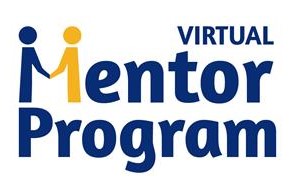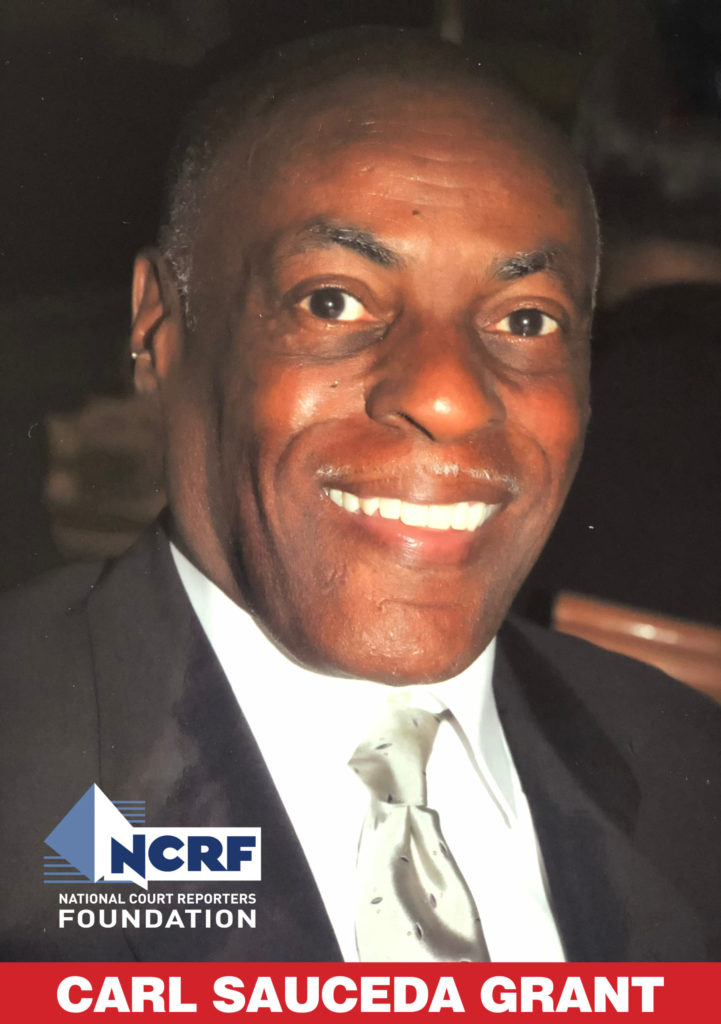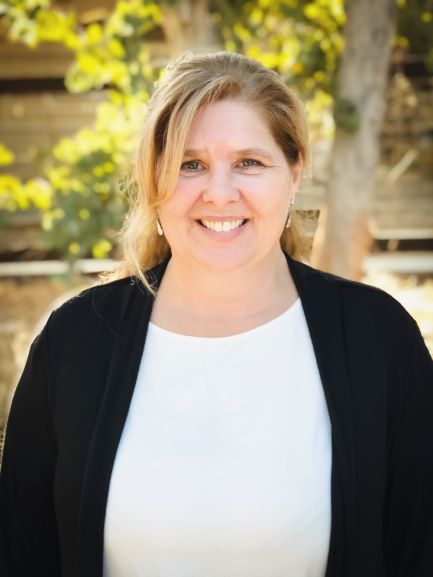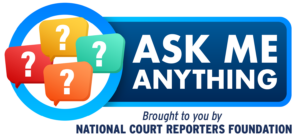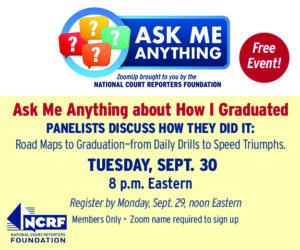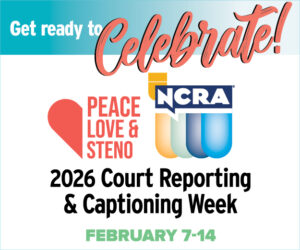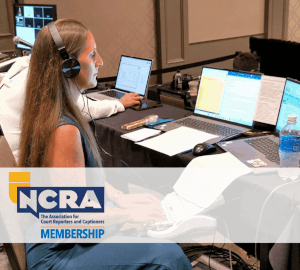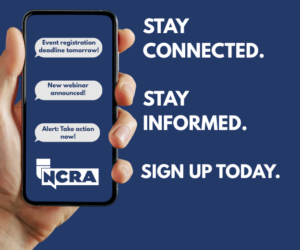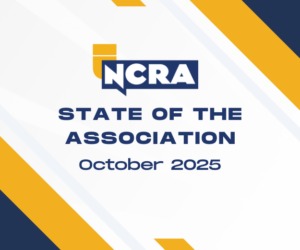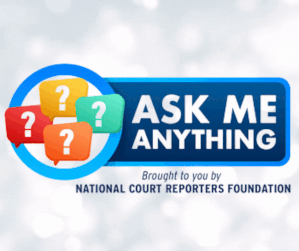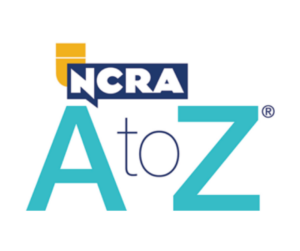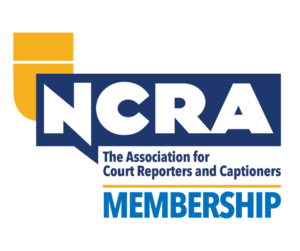NCRA’s Virtual Mentor Program (VMP) is seeking mentors to help support and encourage court reporting students as they work to cross the finish line in their educational journeys and beyond. Mentors are especially needed in California, New York, and Texas, but students are seeking the support and advice of seasoned professionals nationwide.
NCRA’s VMP offers a way for court reporting professionals, students, and new professionals to participate in a mentoring relationship in a virtual setting. Mentors and mentees are matched through the program and are introduced via email. NCRA membership is not required for any professional court reporter or broadcast or CART captioner who wants to register as a mentor for the program. NCRA membership is also not required for any student who is currently enrolled in a court reporting training program interested in signing up for the program.
The mentors function as coaches, role models, and resources to mentees, and they often collaborate with a student and a court reporting teacher to set reasonable goals for academic progress, offer support and feedback when needed, and introduce the mentee to the “ins and outs” of the profession.
“It was my pleasure to mentor students whenever requested,” said Carl Sauceda, FAPR, RMR, (Ret.), a past president of NCRA from Hayward, Calif., who is often cited as a leader in building mentoring networks. “Mentoring was one of the things that I enjoyed most in my career. During my tenure as an official reporter, I mentored so many students that I can hardly remember the number,” he added. Recently, the National Court Reporters Foundation announced the launch and opening of the first NCRF Carl Sauceda Grant in his honor.
Sauceda said the greatest reward for him from being a mentor is seeing so many of his mentees becoming court reporters and reaping the fruits of this wonderful profession.
“My focus was to stress the importance of professionalism, politeness, courtesy, and appearance. In other words, provide an in-depth overview of life as a court reporter. No matter how busy I was, I always devoted the time necessary to give the students the time to ask questions and to understand the challenges and rewards that come with the job,” he added.
NCRA member Laura Axelsen, RDR, CRR, CRC, is a freelance court reporter and occasional captioner with 37 years of experience from Dixon, Calif., who led a session about mentoring at the 2021 NCRA Conference & Expo held in Las Vegas, Nev. She credits her father as serving as her mentor. Today she still requests advice from colleagues when she needs it. She also volunteers as a mentor to a number of students.
“I love this profession, and I want it to continue. I want students to have support and not give up,” said Axelsen, who noted that she connects with her mentees on a weekly basis. “If students feel unsupported in school, a mentor can bridge that gap. Also, the mentor is the student’s holy grail. They are excited to have us,” she added.
To be a good mentor, Axelsen offers the following tips: Learn the art of listening without interrupting; always be encouraging, even if the student has done nothing since the last time you spoke; and don’t be a diva.
“It only takes half an hour a week to make the difference between a student’s staying or giving up,” Axelsen said.
Lisa Conley Yungblut, RDR, RMR, CRR, an official court reporter from Cincinnati, Ohio, said that now more than ever mentoring is important because so many court reporting programs are online, limiting the opportunity for student-reporter interaction.
“During reporting school my mentor was my sister-in-law, who was a reporter at Mobley Reporting. I’m not sure that NCRA had a mentor program at that time, but my unofficial mentors after becoming a working reporter were Pamela Spangler, Mary Jones, and Lois Roell, [RMR], among others. They were reporters I worked closely with during training and through the Ohio Court Reporters Association,” she said.
“Since beginning my officialship, the other reporters in the courthouse have been very helpful, as well as other officials throughout the country. I find it so much easier to learn by seeing others do something rather than reading instructions alone, and not everything is always in writing,” she noted.
Yungblut has been a mentor through NCRA’s VMP for several years, and currently has three mentees whom she corresponds with mostly via emails. However, one, she said, was able to shadow her in court last year.
“With school programs and seminars being online only, I think having a continued sense of belonging to the profession as a whole is beneficial and helpful to keep students encouraged and allow them to see that goals are reached and it’s all worth it,” she said. “Mentoring doesn’t take a lot of time, but the students seem to really like it. It’s interesting to look back to when I was a student and through all of the various stages of reporting in my own life, so it’s good for my own reflection too.”
Sauceda agrees. “I would encourage all reporters to become a mentor to a student. Remember, we were students at one time, and many of us didn’t have anyone to look to for the encouragement to guide us in the right direction. Students definitely appreciate the opportunity.”
Students and NCRA members interested in learning more about the Virtual Mentor Program can find more information at the Virtual Mentor Program home page or by emailing the Mentoring Program Manager at vmp@ncra.org for more information.
Please note: NCRA members mentoring a student through the Virtual Mentor Program may be eligible for PDCs toward NCRA certification(s). Please download the VMP Mentoring and Interning Log Form on the Virtual Mentor Program home page for more details. Members can find information on PDCs by visiting the Continuing Education and Continuing Education Program Rules sections of the website. Visit the VMP FAQs or download the Virtual Mentor Program Handbook for additional information.
